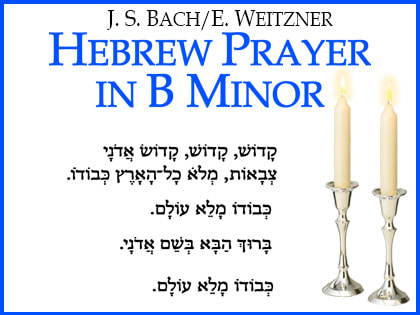Dr. Eric Weitzner, creator of this adaptation, shares his inspiration and intention for developing this new work:
In 2005 I began to have a sense of regret that there was no tradition of sacred Jewish music that rivalled that of the Christian tradition of Mass settings. I was familiar with Salamone Rossi’s vocal settings for the synagogue, and knew that Bloch and Milhaud had done settings of Jewish services. But there was nothing that approached Bach’s Mass in B minor in grandeur.
One day I had the idea that it might be possible to replace Bach’s Latin text with a Hebrew one. I realized that even if it were possible, it would be a difficult task, and that no one besides me was likely ever to attempt it. I developed a strong desire to hear a Jewish version of the B minor Mass sung in Hebrew. I began experimenting in my spare time with writing a Hebrew liturgical text that would have roughly the same rhythm as the Latin Mass. It would have to be singable, using Bach’s choral setting; each movement in Hebrew would have to fit the emotional tone or affekt of Bach’s music; and each Hebrew movement would have to express a Jewish religious idea that was related to the Christian idea of the corresponding Latin one.
The Hebrew Prayer in B Minor has exactly the same structure as Bach’s original composition. There is no change in the music, except that here and there two notes are tied together, or a note is split in two, in order to accommodate the new text.
The theology is often very close in the Latin and the Hebrew, the main exceptions being that in the Hebrew version the Trinity is eliminated, and the three mysteries in the Latin Credo are replaced by Jewish doctrines.
The Latin Kyrie section, which asks God for mercy, is replaced by the Hebrew Krav-na, which asks God to draw near.
The Gloria is replaced by Tif’ara, one of the many Hebrew words for glory; both the Latin Gloria and the Hebrew Tif’ara contain similar expressions of praise.
The greatest difference is between the Latin Credo and the Hebrew Ani ma’amin, which means “I believe,” just as does “Credo” in Latin. To replace the Nicene Creed I used the Thirteen Principles of Faith formulated by Maimonides, the great twelfth century Jewish legislator, in his commentary on the Mishnah, written in Judeo-Arabic. Some versions of the Jewish prayerbook contain a poetic Hebrew version of these thirteen statements, each beginning with the words “Ani ma’amin” (for female singers, “ma’amin” becomes “ma’aminah”).
Both the Christian and the Jewish credos begin with the belief in one Creator, maker of heaven and earth, and end with the belief in the resurrection of the dead. Everything else is very different.
The Christian belief in Christ as Lord, son of God, and Savior is replaced by the Jewish belief in the radical unity and transcendence of God, who is First and Last. The Incarnation, Crucifixion, and Resurrection of the Christian faith are replaced by the Jewish belief in an omniscient God who punishes those who violate His commandments, and rewards those who observe them.
The Christian belief in the Holy Spirit as the person of the Trinity who gives life and speaks through the prophets, is replaced in the Jewish version by the Jewish belief that Moses is the father of the prophets, that the Torah was given to him in its entirety, and that the words of the prophets are truth. The Christian confession of baptism is replaced by the Jewish expectation of the coming of the Messiah.
The Latin Sanctus is translated back into the original Hebrew of Isaiah 6:3; the Hebrew for Sanctus (“Holy) is Kadosh.
The Latin Osanna is replaced by the Hebrew K’vodo male ‘olam—“His glory fills the world”; this is a phrase from Ezekiel 3:12 that occurs together with the thrice holy passage from Isaiah in one of the prayers recited in the synagogue on the Sabbath and Festivals.
The Latin Benedictus is also translated directly back to the original Hebrew (Barukh haba) in Psalms 118.
For the Latin Agnus Dei, the Hebrew version replaces the Lamb of God with God Himself: “Lord, You who forgive sin and iniquity, have mercy on us, we pray.”
The Latin Dona nobis pacem translates easily into Hebrew: “Grant us peace" (shalom).
My hope when I began working on a Hebrew version of the Mass in B minor was that I and others who love the Hebrew language and Jewish liturgy would be able to hear liturgical Hebrew set to Bach’s sublime music. I hoped that the Hebrew words would thereby be ennobled by the music. But as I worked on it, especially when I discovered how easy it was to find Jewish equivalents for the different parts of the Gloria, I began to sense the deep common roots that connect the two liturgies. This was confirmed by the sources I was able to find, for example in Eric Werner’s book The Sacred Bridge.
So now I hope that listeners will sense in the Hebrew version a spirit that is similar to the Christian one, and a natural kinship between the two faiths.
E. Weitzner
The file below features Dr. Weitzner's adaptation with Hebrew text and parallels to Bach's Latin Mass in B Minor.
| hebrew_prayer_in_b_minor_program___complete_text.pdf | |
| File Size: | 3804 kb |
| File Type: | |
This concert is made possible with support from
<iframe src="https://player.vimeo.com/video/702444621?h=2879607c85" width="640" height="360" frameborder="0" allow="autoplay; fullscreen; picture-in-picture" allowfullscreen></iframe>




